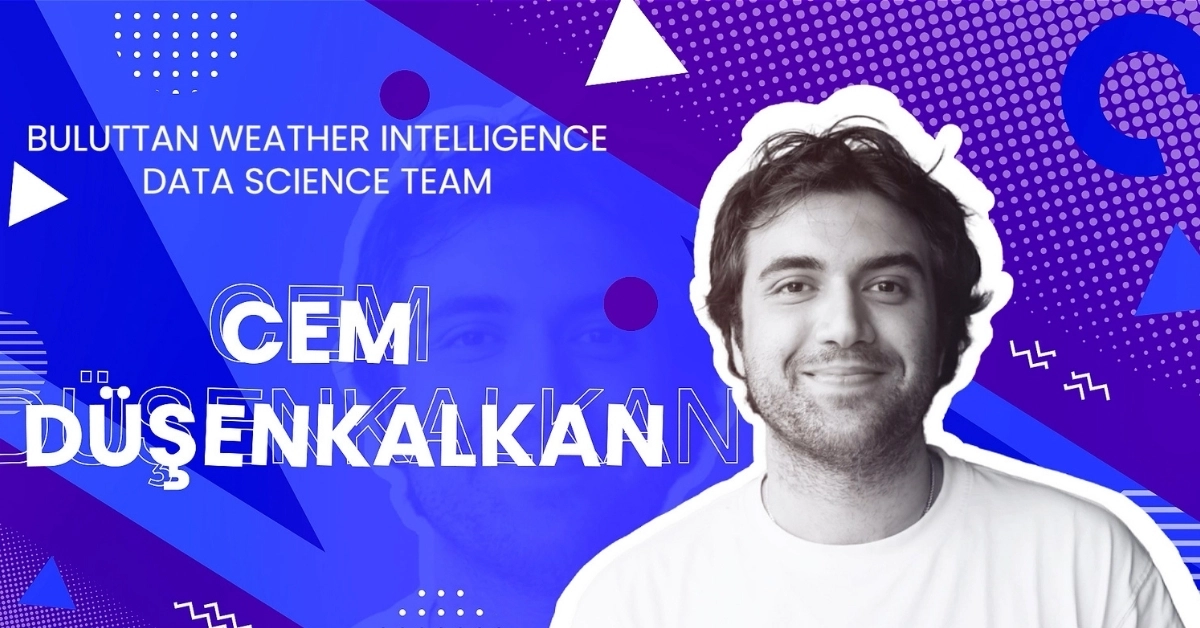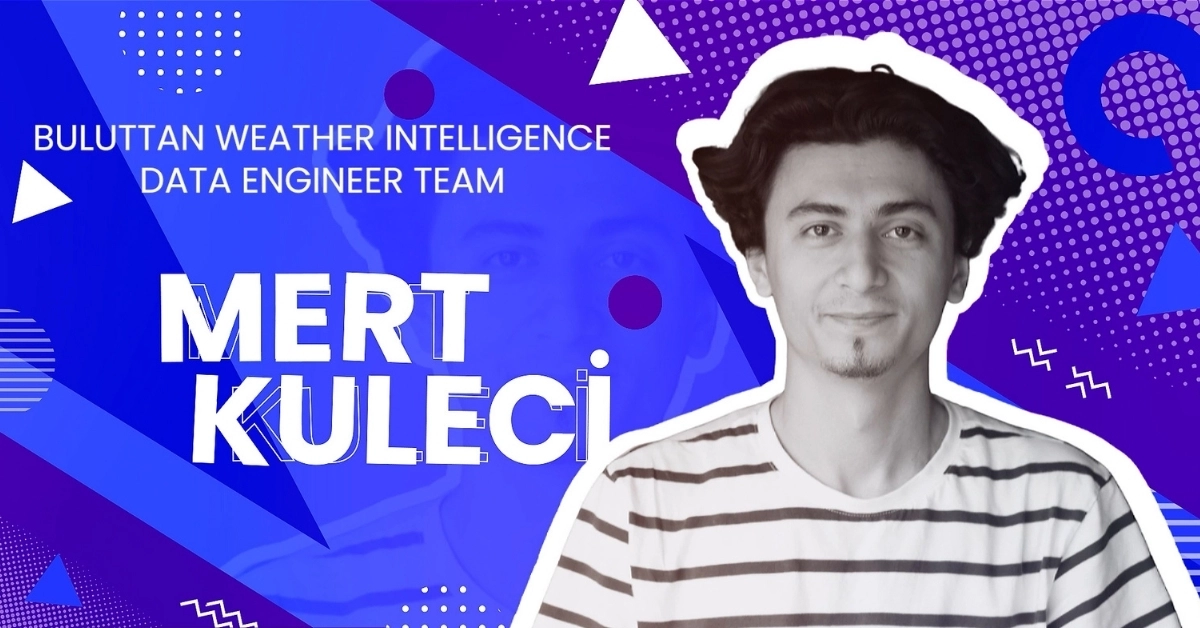In this episode of Buluttan Small Talks with Elis. Elis shares with us today what she does as a project engineer and modelling advisor at Buluttan, his views on the future of Buluttan, and the things she enjoys doing.
Gökmen: Yes, today we're with Elis. Welcome, Elis.
Elis: Thank you, nice to be here.
Gökmen: How are you doing?
Elis: Thank you, I'm good. How about you?
Gökmen: I'm also good, thank you. It's enjoyable chatting with you. Today, we'd like to get to know Elis a bit and also understand what you do at Buluttan. How do you perceive weather intelligence? What else does Elis do besides Buluttan? Where do you find enjoyment? Let's start with who Elis is.
Elis: Since I'm currently a doctoral student, let's start with that aspect. Being here might be a result of that. It could be my feature or my effort. I'm a doctoral student at Istanbul Technical University, focusing on atmospheric science in the thesis phase. I have mainly worked on atmospheric modeling at the climate scale, along with hydroclimatology studies. My role here encompasses similar responsibilities related to my expertise.
Gökmen: Although you're currently focused on atmospheric sciences at the master's and doctoral levels, your undergraduate degree is from a different field, right? You shifted from astronomy and space sciences to meteorology. How did that transition happen?
Elis: It's an interesting story. Astronomy is quite theoretical. In that field, we deal with things that are rare to observe directly. Unless we're discovering a planet or constantly working with telescopes, understanding our field of study and making it comprehensible to the human mind is quite challenging. My transition to meteorology was partly due to my growing interest in computers. In meteorology, we have a more tangible aspect. We can both understand the data we produce and apply it in our daily lives, which has a significant impact. For example, when we see a cumulonimbus cloud while driving, we can predict that it might hail in the next five minutes during summer or spring. Being able to give such examples and visualize these phenomena makes the work very satisfying. I also had an interest in numerical calculations and coding, which aligned well with meteorology as I progressed in my studies.
Gökmen: It seems like you were drawn more towards modeling. After starting with astronomy, you're now in the final stages of your master's and doctoral degrees, heavily involved in modeling. How did you transition from astronomy academia to meteorological applications in the real world, possibly through Buluttan? Besides meteorology, what else does Elis do? Both are fascinating fields, and I'm also quite interested in them. How do they influence your personal life, and what brings you joy?
Elis: I always had an inclination towards studying snow in meteorology. There are several reasons for this. Firstly, I'm from Bursa, where we often experience snow. Since childhood, activities like making snowangel, playing with snowballs, and going to the mountains have been part of my life. Snowboarding is one of my favorite hobbies, and I've been doing it for many years. Before that, I also did skiing. Understanding weather conditions and my surroundings has become somewhat of a hobby for me. I also enjoy camping and outdoor sports. For a period, I was interested in paragliding, where I learned about thermal winds. Understanding and observing our environment has shaped my hobbies. In university, while studying synoptic meteorology, I discovered my love for maps and colors. This led me to painting. I had a pre-existing interest in art, and studying maps and colors in meteorology further fueled that interest. I enjoy expressing what I learn and observe through various mediums, such as painting and writing. These are the main aspects of my hobbies, among others.
Gökmen: Your description resonates with me. The focus on observation, understanding, and how it ties into your work, interests, and hobbies is quite intriguing. Now, moving from astronomy to modeling, there's a film aspect in it as well. However, at the end of the day, there's the aspect of predicting and forecasting future scenarios, using data and processing power intensively. In recent years, there has been an exponential increase in meteorological data collection globally. We also see advancements in supercomputing and quad-computing technologies, making it easier and more cost-effective to process and analyze data at higher speeds. When you combine these factors, it not only improves weather intelligence but also enhances our understanding of the impact of modeling. How do you view this evolution in weather intelligence and climate work currently? There's a growing need for it, given the increasing frequency of extreme weather events. It's becoming easier to conduct more accurate, long-term forecasts. Perhaps, looking back in a decade, we'll have made significant progress. We'd love to hear your thoughts on this area.
Elis: Looking back from yesterday to today, there's a significant difference both personally and academically. The increase in computational power and its accessibility is crucial. Also, the awareness about climate change and the extreme events it causes is rising. As you mentioned, predicting these events becomes more challenging every day. Unlike the past, where we could create a model twenty years ago and predict the next hundred years, it's getting harder. Our access to computational power will certainly make this process much easier. Additionally, the development of models is vital. Since the atmosphere is chaotic and we don't model every parameter accurately, improving our models' environment will enhance the accuracy of our predictions. Furthermore, machine learning and artificial intelligence play a significant role. While we generate data with modeling, having mechanisms that can identify patterns in the outputs or various observations improves our predictions. I can't even imagine where we'll be in ten years from now. A decade ago, artificial intelligence wasn't as prevalent. Now, we might be able to incorporate all parameters and accurately predict chaotic situations in the future.
Gökmen: At least, we'll get closer. We'll strive for more distant, consistent, and highly accurate predictions. That sounds great. We wish everyone in the field of meteorological engineering, including students and professionals, and Buluttan's partners and followers all the best. What would you like to say?
Elis: Don't fall behind in technology. Stay updated with Buluttan. As I mentioned earlier, the working environment here is excellent. I would love for everyone to come and get to know my colleagues and other coworkers here. I also welcome you to get to know me. Weather intelligence is a relatively new and increasingly important field in Turkey. There needs to be more focus on this topic, especially given that our country is climatically fragile. We need to raise awareness about climate change and its significance. Therefore, I invite everyone to learn about Buluttan, meteorology, and climate change.
Gökmen: That's a fantastic conclusion. We wish everyone the best. Send our greetings and love to Burcu behind the camera.







